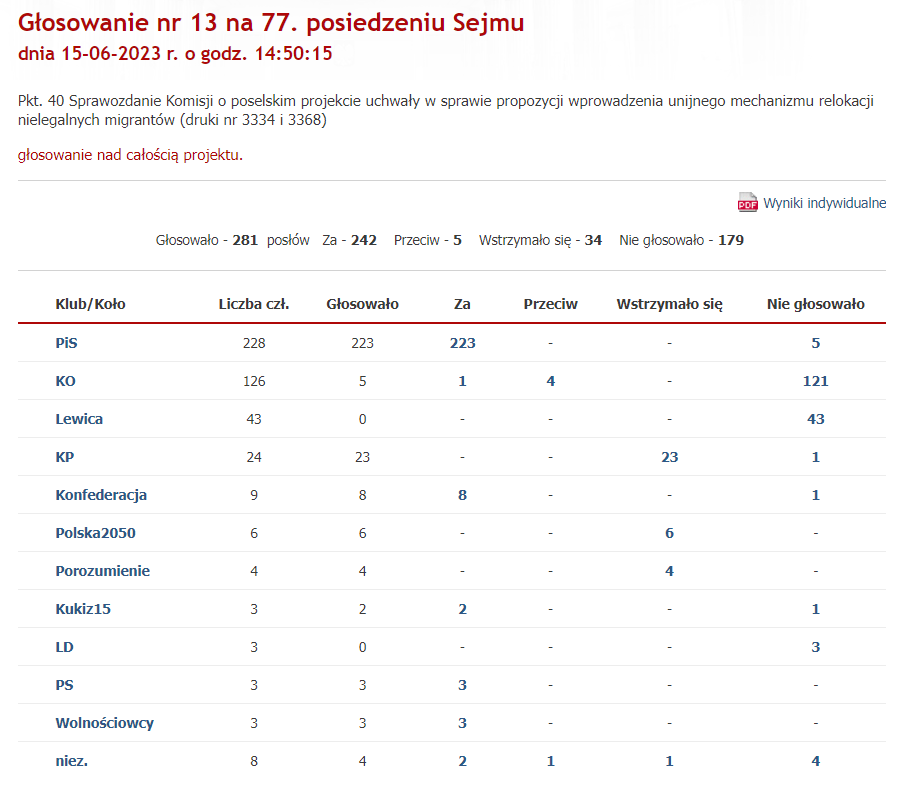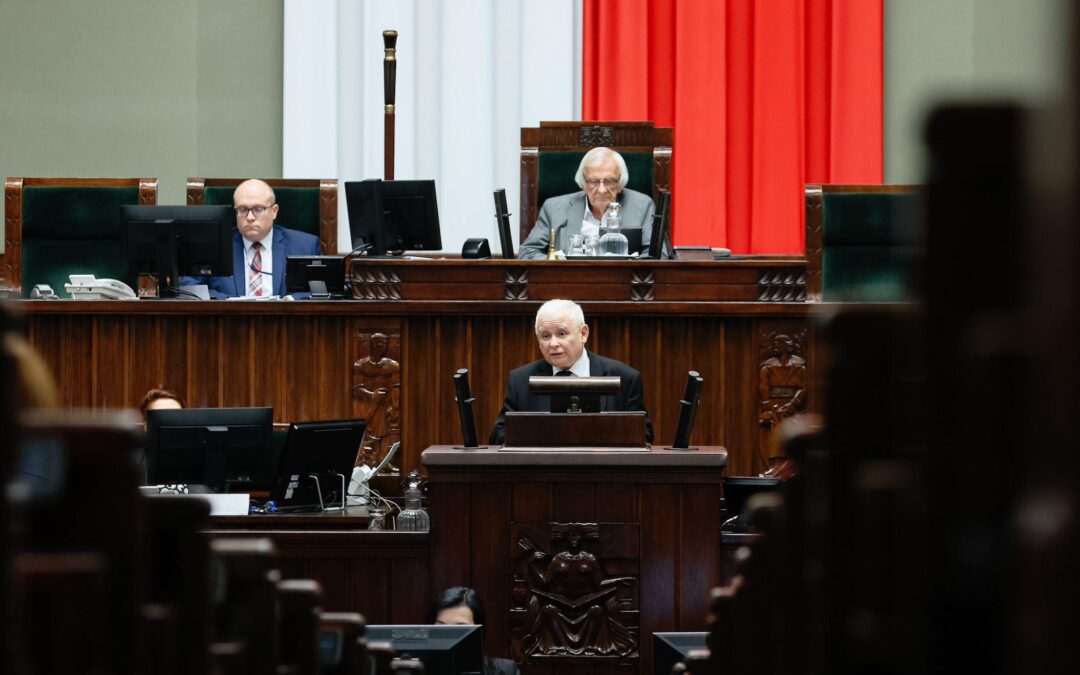The government’s majority in parliament along with the far right has passed a resolution opposing an EU plan to relocate migrants and asylum seekers within the bloc. Countries that do not want to take in their share would instead have to pay a financial contribution.
During a debate on the resolution, Jarosław Kaczyński announced that the ruling national-conservative Law and Justice (PiS) party he leads would organise a national referendum to give Poles a say on the EU plan.
However, opposition parties – who did not support the resolution – accused PiS of exploiting the issue to cover up its own failings and to boost its ratings ahead of this year’s elections.
Last week, a majority of EU states approved the migrant relocation plan, with only Poland and Hungary voting against it. The proposal still needs to be discussed by the European Commission and European Parliament.
Poland has condemned new rules agreed by EU member states, which will require countries to pay €20,000 for each relocated migrant or asylum seeker they refuse to take in.
It was one of only two countries, along with Hungary, to vote against the deal https://t.co/XLKlQlPS3i
— Notes from Poland 🇵🇱 (@notesfrompoland) June 9, 2023
“The Sejm of the Republic of Poland expresses its strong opposition to the attempt to introduce mechanisms for the forced relocation of illegal economic migrants at the European Union level,” read the resolution.
“We do not agree that the Polish state should bear the social and financial costs of the bad decisions of another European Union member state,” it continued. “The ‘open door’ policy, which was pushed through by Germany, violating the treaties, turned out to be a big mistake.”
The resolution also noted that around seven million refugees from Ukraine have entered Poland since Russia’s invasion, and that around 1.5 million of them remain in the country.
The Polish government estimates that 1.3-1.4 million Ukraine refugees remain in the country one year on from Russia’s full-scale invasion.
Poland has been the primary destination for those fleeing the war https://t.co/HQB8YAvcpQ
— Notes from Poland 🇵🇱 (@notesfrompoland) February 23, 2023
“In the current situation, attempts to additionally burden our country with the obligation to accept illegal immigrants coming to other member states or to impose an obligation to pay financial penalties must arouse deep opposition,” it said, describing the plan as “unlawful interference” in domestic affairs.
A total of 281 MPs voted in favour of the resolution, with the vast majority (223) coming from the PiS caucus. It was also supported by eight MPs from the far-right Confederation (Konfederacja) as well as ten other independents and members of smaller groupings.
Only five MPs voted against the resolution, with a further 34 abstaining and 179 – including from the two main opposition groups, Civic Coalition (KO) and The Left (Lewica) – not voting at all.

Speaking ahead of the vote, Prime Minister Mateusz Morawiecki warned – as his PiS party did during the 2015 migration crisis – that allowing in migrants and refugees from outside Europe would threaten Poles’ safety.
“Data [show] Poles say they feel safe,” he said. “And what is the situation abroad…in France or in Germany, in Sweden or in Italy?”
“In many of these cities, the beautiful cities of Paris, Marseille or Rome, we are dealing with districts of terror; tyres are on fire, cars are on fire, women are afraid to go out for a walk in the evening,” he claimed. “They know today that they made a dramatic mistake.”
88% of Poles say they feel that Poland is a safe country to live in while only 9% think it is not, finds a regular @CBOS_Info poll.
The proportion feeling the country is safe rose after the current government came to power in 2015 and has remained high since then pic.twitter.com/L8WrQgAPUm
— Notes from Poland 🇵🇱 (@notesfrompoland) May 19, 2023
Kaczyński told parliament that the EU proposal “undermines Polish sovereignty” and is “contrary to the [EU] treaties”, reports the Polish Press Agency.
He and other PiS figures noted the fact that, while the EU has provided Poland with less than €100 euros in support for each Ukrainian refugee it is hosting, Brussels is now proposing that countries which refuse their share of relocated migrants should pay €20,000 per person.
“This is brazen discrimination,” said Kaczyński. “We will not agree to it. The Polish nation does not agree to this either. This must be the subject of a referendum.”
The PiS chairman gave no further details about the planned referendum, but later government spokesman Piotr Müller confirmed that one would be held and that it would give Poland “stronger, clearer legitimacy against which Brussels will have to reckon”.
#Wiadomości | Prezes Prawa i Sprawiedliwości Jarosław Kaczyński zapowiedział przeprowadzenie referendum w sprawie unijnego przymusu przyjmowania nielegalnych migrantów.
[1/2] pic.twitter.com/iiLLW0AuTY
— WiadomościTVP (@WiadomosciTVP) June 15, 2023
Kaczyński’s arguments were, however, challenged by Maciej Gdula, an MP from The Left. If the EU’s plan undermines national sovereignty, why did only two of the EU’s member states vote against it, he asked.
“You were unable to convince any of these 25 countries to support the Polish position,” he said, quoted by the Dziennik Gazeta Prawna daily. “Why was the government unable to get money for the Ukrainian [refugees]? The government has failed.”
Now, he argued, the government is trying to “scare the people” with the supposed threat of foreigners whereas in actual fact, since PiS came to power, it has overseen Poland’s largest ever wave of immigration, including of many people from outside Europe. This is something to be welcomed, said Gdula.
Poland has issued more first residence permits to non-EU immigrants than any other EU member state for the fifth year running.
It issued almost one million permits in 2021, more than twice as much as any other country and one third of the EU total https://t.co/dv26mHQfWt
— Notes from Poland 🇵🇱 (@notesfrompoland) August 11, 2022
Jan Grabiec, spokesman for Civic Platform (PO), which is the main party in KO, likewise accused PiS of seeking to exploit this issue for political purposes because its “polling numbers are low and has run out of campaign ideas” ahead of this autumn’s elections, reports Wprost.
Krzysztof Bosak, one of the leaders of Confederation, also argued that Kaczyński’s remarks are “an attempt to cover up the extremely pro-immigration policy of the PiS government [which] legally allowed tens of times more immigrants from other continents into Poland than the EU wanted to send to us”.
Meanwhile, leading figures from the Polish People’s Party (PSL) and Poland 2050 (Polska 2050) – two allied centre-right parties – declared that they are opposed to any EU relocation system but accused the government of being ineffective in protecting Polish interests in Brussels.
Main image credit: Prawo i Sprawiedliwość/Twitter

Daniel Tilles is editor-in-chief of Notes from Poland. He has written on Polish affairs for a wide range of publications, including Foreign Policy, POLITICO Europe, EUobserver and Dziennik Gazeta Prawna.




















